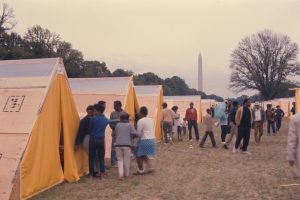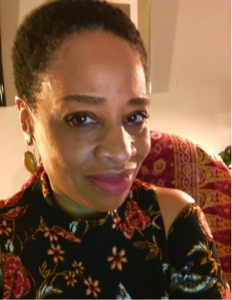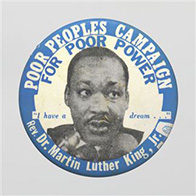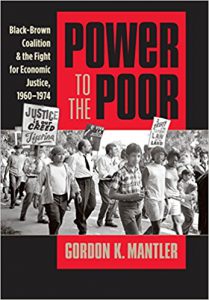April 23, 2018
Aaron Bryant is the curator of photography and visual culture at the National Museum of African American History and Culture. Before coming to the Smithsonian, Bryant was curator for the renowned collection at Morgan State University and the University’s James E. Lewis Museum of Art. In addition, he has curated and developed intellectual content for exhibitions at the National Electronics Museum, the National Institutes of Health and Library of Medicine.
Before coming to the Smithsonian, Bryant was curator for the renowned collection at Morgan State University and the University’s James E. Lewis Museum of Art. In addition, he has curated and developed intellectual content for exhibitions at the National Electronics Museum, the National Institutes of Health and Library of Medicine.
Bryant has lectured on cultural theory and historiography at Harvard, Johns Hopkins, Duke, the Metropolitan Museum, Cambridge, Oxford and the British Museum. His research also has appeared in publications ranging from academic journals and catalogs to anthologies in political history, performance studies and the visual arts. His forthcoming essay “Critique, Pictures, and Progress” will appear in the anticipated book The Beautiful Ghetto (2017) by Devin Allen, and his essay “Democracy across the Borders” will appear in the global anthology Visual Histories of South Asia (2017), edited by Annamaria Motrescu-Mayes and Marcus Banks.
Bryant‘s research has been recognized with honors from the Lyndon Johnson Presidential Library, the New York Public Library, the Maryland Historical Society, the University of Maryland, the Smithsonian Institution, the American Association of Museums, the African American Museum Association, and the Organization of American Historians and Immigration and Ethnic History Society. In 2014, he was appointed a fellow with the Royal Anthropological Institute (UK) for his research in social movement theory and visual anthropology.
The former chair for the Baltimore City Commission to Review Confederate Monuments, Bryant currently serves as jury committee chair for the DC Congressional Arts Competition. He is also a commissioner for the Baltimore City Commission for Historical and Architectural Preservation.
April 16, 2018
A. Adar Ayira is on the Senior Leadership Team at Associated Black Charities (ABC). ABC’s focus is to strengthen Maryland’s economy by broadening economic opportunities and access and reducing structural and institutional racialized barriers that impede the health and economic growth, inclusion, influence, and wellbeing of African Americans. Associated Black Charities is the region’s only African American philanthropic organization providing coordinated leadership on issues impacting Maryland’s communities.
ABC’s focus is to strengthen Maryland’s economy by broadening economic opportunities and access and reducing structural and institutional racialized barriers that impede the health and economic growth, inclusion, influence, and wellbeing of African Americans. Associated Black Charities is the region’s only African American philanthropic organization providing coordinated leadership on issues impacting Maryland’s communities.
Prior to her tenure with ABC, Adar was Founder — and for 19 years Principal Consultant — at Core Concepts, a nonprofit-specialist consulting firm that provided skills development; strategic planning; technical assistance; organizational, board, and program development; and project management for nonprofit organizations. Ms. Ayira is also an experienced IED (Interim Executive Director) in the field of Interim Executive Leadership, working with grassroots organizations to provide effective leadership during times of organizational transitions. At Associated Black Charities, her portfolio includes educating and training in the policy and institutional realms regarding the impact of racialized structural barriers and the ways in which racializations and implicit biases operate in our workplaces — and on the economic and societal benefits of working to eliminate them.
Adar has been a facilitator and trainer on racial equity for more than 20 years and has provided presentations, facilitations, and trainings for nonprofit organizations, community groups, and individuals in the region, including Baltimore Integration Project, Community Foundation of Prince George’s County, Deutsch Foundation’s “Moving MD Forward Network”, DHR-SSW, Humanim, Jews United for Justice (Jeremiah Fellowship), Mt. Washington Pediatric Hospital, Primary Care Coalition, The Baltimore Grassroots Criminal Justice Network, Kennedy-Krieger, Women of the World Conference, University of MD School of Social Work, and Towson University (“The School to Prison Pipeline”), among others.
A founding member and founding Advisory Board Member of Baltimore Racial Justice Action – a network of Maryland professionals committed to the transformation of systems to achieve social and economic equity, with an emphasis on racial equity — Adar also continues her work with them as Senior Facilitator/Consultant and a Trainer of their trainers. Adar also analyzes trends/manifestations of racism, intersectionalities, and their impacts on society.
The 2011 recipient of the YWCA Baltimore’s Racial Justice Award, Adar is a popular racial equity speaker, presenter, frequent radio guest, panel moderator, and facilitator/trainer in nonprofit, business, community, and other forums. A Poet/Spoken Word Artist in the Baltimore-Washington area, she has been a featured performer at Center Stage, the Spotlight Theatre, the Frederick Douglass-Isaac Meyers Maritime Museum, and the Reginald F. Lewis Museum, among other venues. Adar has also created and guided programming using poetry as a healing and empowerment tool for Catherine’s Hearth and for women residing at Jessup Correctional Institution.
She was a contributing author to the national teaching text “Lessons from ‘The Color of Fear’: Field Reports” (Volume IV), Baltimore Open City, and various poetry publications, as well as being a contributing blogger for Rooflines, the National Housing Institute’s Shelterforce blog. A sociologist with a background in Communications/Radio, she has also worked in three major radio markets and was host of a popular public affairs show called “Public Notice” in the Washington DC market.
March 5, 2018
Panelists:
Ciera Dunlap, Case Management Supervisor at YES (Youth Empowered Society, a drop-in day center for homeless youth 18-24), a Journey Home Board member, and an advocate for youth experiencing homelessness in Baltimore City, is impacting the lives of the youths she interacts with. Ciera is passionate about her work and is making a difference in the lives of youths experiencing homelessness by helping to develop leadership skills and by meeting youths immediate and basic needs. Ms. Dunlap serves on the Journey Home Board—Baltimore’s HUD required Continuum of Care for ending homelessness by focusing on permanent supportive housing. She has herself experienced homelessness.
Sara Pratt practices law in the area of fair housing and civil rights, including lending and civil rights compliance, currently for the law firm of Relman, Dane & Colfax. Previously, Ms. Pratt was Deputy Assistant Secretary for Enforcement and Programs at HUD’s Office of Fair Housing and Equal Opportunity and oversaw HUD’s enforcement of the Fair Housing Act and other civil rights laws, the Fair Housing Assistance Program, the Fair Housing Initiatives Program and HUD’s enforcement of Section 3 of the Housing and Urban Development Act. As HUD’s Director of Enforcement between 1993 and 1999, Pratt participated in a number of initiatives relating to discrimination in housing and lending including leading FHEO’s enforcement of the Fair Housing Act and other civil rights laws. In addition to government roles, Pratt staffed the National Commission on Fair Housing and Equal Opportunity, co-chaired by former HUD Secretaries Jack Kemp and Henry Cisneros, and helped prepare a report issued in December 2009 on the future of fair housing. She assisted with the development of the report to the United Nations Committee on the Elimination of Racial Discrimination “Residential Segregation and Housing Discrimination in the United States,” issued in January 2008. She was a member of the faculty of the National Fair Housing Training Academy and the National Fair Housing Alliance’s Fair Housing School and served on the Leadership Conference on Civil Rights Fair Housing Task Force. She has worked as an attorney, trainer and fair housing and civil rights expert for more than thirty years.
Tony Simmons is a staff member of Baltimore’s Right to Housing Alliance. His interview on National Public Radio’s Morning Edition focused national attention on the scourge of homelessness and the daily struggles of the homeless populations for the basic elements of survival. Like Ms. Dunlap and Mr. Williams, he has himself experience homelessness.
Jeff Singer organizes, does policy work, and undertakes outreach for CASH: City Advocates in Solidarity with the Homeless. He worked for fifteen years at the Baltimore City Department of Social Services and for twenty-five years at Health Care for the Homeless in such fields as child and adult protective services; mental health, addiction, and HIV services; and nonprofit administration. Singer retired in 2011 after the agency’s millionth patient visit. During the 1990s he directed the National Mobilization Project for the National Health Care for the Homeless Council, seeking to create the right to housing and health care in the U.S. Singer helped organize the Baltimore Homeless Union, the People’s Homesteading Group, the Homeless Persons Representation Project, Housing Our Neighbors, the People’s Vacant Housing Survey, and the self-managed homeless shelter, Eutaw Center. He has published in street newspapers, academic journals, and books on health care, housing, poverty, addictions, homelessness, and justice. He is now an outreach worker and instructor in social policy and surrealism.
Marc Steiner has been a fixture in Baltimore media and public affairs for 25 years, beginning with his radio show on WJHU, which continued on WYPR and WEAA. He has become one of the most recognized voices in Maryland and has gained national acclaim for his insightful style of interviewing. As president of the Center for Emerging Media, he won a Peabody Award, the most distinguished award in broadcast media, for the series “Just Words.” Mr. Steiner participated in the Poor People’s Campaign, spending five weeks during 1968 in “Resurrection City” (on the National Mall).
Anthony Williams is the Sexton at the First Unitarian Church and is helping to reduce and eradicate homelessness as the chair of the Journey Home Consumer Advisory Committee and as a member of the Mayor’s Workgroup on Homelessness, which advises the Journey Home and the Mayor’s Office of Human Services on the views of homeless people. Mr. Williams and the Chair of the Journey Home board, worked together this past summer to open a dialogue and conversation between the residents of the encampment in front of city hall and the mayor of the City of Baltimore. Mr. Williams has worked in New York as well as Baltimore and his life has been depicted in the play, “The King of Howard Street.” Mr. Williams serves on the Journey Home Board and has himself experienced homelessness.
_______________________________________________
February 12, 2018
Joshua Clark Davis teaches and researches broadly in twentieth-century United States  history, with a focus on capitalism, social movements, urban history, and African American history. His book, From Head Shops to Whole Foods: The Rise and Fall of Activist Entrepreneurs (Columbia University Press, 2017), examines how small businesses such as natural foods stores, head shops, feminist businesses, and African American booksellers emerged out of social movements and countercultures in the 1960s and ‘70s with the goal of advancing justice and equality in the marketplace. Josh’s writing has appeared in the Washington Post, Slate, Jacobin, and Black Perspectives, and his research has been supported by fellowships from the National Endowment for the Humanities and the Fulbright Scholar Program.
history, with a focus on capitalism, social movements, urban history, and African American history. His book, From Head Shops to Whole Foods: The Rise and Fall of Activist Entrepreneurs (Columbia University Press, 2017), examines how small businesses such as natural foods stores, head shops, feminist businesses, and African American booksellers emerged out of social movements and countercultures in the 1960s and ‘70s with the goal of advancing justice and equality in the marketplace. Josh’s writing has appeared in the Washington Post, Slate, Jacobin, and Black Perspectives, and his research has been supported by fellowships from the National Endowment for the Humanities and the Fulbright Scholar Program.
Joshua is also a devoted public historian with a deep interest in working with communities beyond universities. He serves on the advisory board of the Baltimore Uprising 2015 Archive Project and as a research associate for the Library of Congress’s Radio Preservation Task Force. He also co-directs “Media and the Movement,” a NEH-funded oral history and radio digitization project on activists of the Civil Rights and Black Power era who worked in media.
Elizabeth M. Nix, associate professor in the Division of Legal, Ethical and Historical Studies and a nationally recognized expert on Baltimore’s unrest following King’s murder in 1968, will serve as interlocutor for this and the subsequent session. Nix co-edited an anthology entitled Baltimore ’68: Riots and Rebirth in an American City and co-wrote Introduction to Public History: Interpreting the Past, Engaging Audiences.
Marc Steiner has been a fixture in Baltimore media and public affairs for 25 years, beginning with his radio show on WJHU, which continued on WYPR and WEAA. He has become one of the most recognized voices in Maryland and has gained national acclaim for his insightful style of interviewing. As president of the Center for Emerging Media, he won a Peabody Award, the most distinguished award in broadcast media, for the series “Just Words.”
After a 25-year teaching career at UB, Lenneal Henderson now holds the title of Emeritus Distinguished University Professor, the University’s highest professorial designation. He is a fellow of the National Academy of Public Administration, a position to which only the most august scholars in public affairs and government and nonprofit executives are chosen. In addition to his academic achievements, he is a published poet and noted actor, reprising historical roles including Thurgood Marshall, W. E. B. DuBois, A. Philip Randolph, and Howard Thurman. He is a board member of the Virginia Foundation for the Humanities, past chairman of the Maryland Humanities Council, and past chair or board member for numerous public interest commissions and foundations.
Robert Houston is a nationally celebrated Baltimore-based photographer. His photographic portfolio for Life Magazine forms the heart of the Smithsonian’s “City of Hope” exhibition, based in Resurrection City, built on the National Mall in May, 1968 as a physical manifestation of the Poor People’s Campaign. He has taught numerous symposia on the art and practice of photography.
_______________________________________________
February 5, 2018
Gordon K. Mantler is Director of Writing in the Disciplines and Assistant Professor of  Writing and of History in the University Writing Program at the George Washington University in Washington, D.C. As director, he oversees the WID curriculum in close partnership with departments and schools across the university, including offering workshops and other instruction to faculty and graduate assistants teaching writing. Mantler has taught writing since 2006 including as a Lecturing Fellow and Associate Director in Duke University’s Thompson Writing Program, where he edited Deliberations, the writing program’s journal of first-year writing.
Writing and of History in the University Writing Program at the George Washington University in Washington, D.C. As director, he oversees the WID curriculum in close partnership with departments and schools across the university, including offering workshops and other instruction to faculty and graduate assistants teaching writing. Mantler has taught writing since 2006 including as a Lecturing Fellow and Associate Director in Duke University’s Thompson Writing Program, where he edited Deliberations, the writing program’s journal of first-year writing.
Since 1999, Mantler has specialized in the history and rhetoric of 20th century social justice movements and the African American and Latino experience in the United States, as well as public, oral, and film history. He has received numerous awards and grants, including financial support from the Mellon Foundation, the American Council of Learned Societies, the Black Metropolis Research Consortium, and the Lyndon Baines Johnson Presidential Library, to name a few. He also received the first annual Ronald T. and Gayla D. Farrar Media and Civil Rights History Award for the best article on the subject.
His book, Power to the Poor: Black-Brown Coalition and the Fight for Economic Justice, 1960-1974 (University of North Carolina Press, 2013 cloth, 2015 paper), received excellent reviews, including being named a top 10 book in 2013 by the Left Eye on Books blog.
In addition to his expertise on antipoverty activism and multiracial coalition-building in the 1960s and 1970s, Mantler is working on several new studies. The current book project — tentatively entitled We Have Won? Harold Washington and Multiracial Politics in the Age of Reagan — focuses on Chicago in the 1970s and 1980s, and the development of the grassroots multiracial coalitions that brought the city’s first black mayor to power in 1983. This book contextualizes Washington’s surprising election within the broader rise of black and Latino electoral politics and the so-called Reagan Revolution, or rise of conservatism. Another history project explores the different forms of public history in the nation’s capital, and how grassroots activists in particular shaped museum exhibits, memorials, monuments, and films in Washington, D.C., especially the ways in which these public spaces narrated the history of race in the United States. Mantler conducts and writes about pedagogical research on the impact and efficacy of using student publications, such as Deliberations and journals like it, in the first-year writing classroom. And now as director of WID, Mantler has begun to explore research on pedagogical practices in WID. He is also an oral historian, both for his own research and others, such as the Southern Oral History Program’s Media and the Movement project. In a former life, Mantler worked in daily newspaper journalism at the St. Petersburg Times (now the Tampa Bay Times) in Florida and the Greenville News in South Carolina.